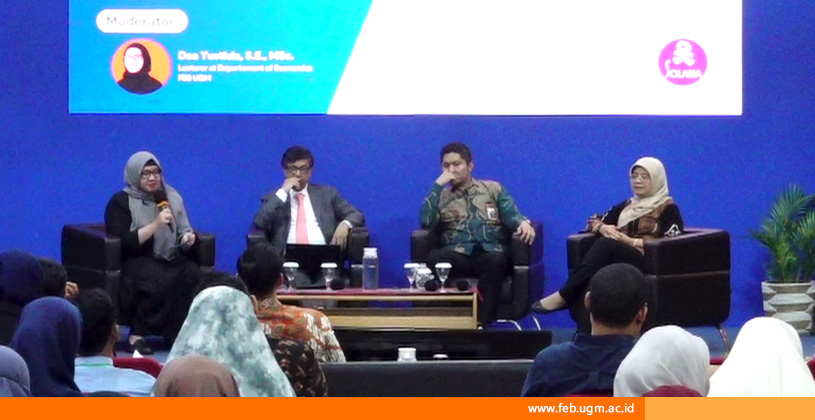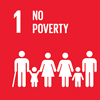Indonesia's Islamic Financial Inclusion Still Low
- Details
- Written by Kurnia
- Category: News
- Hits: 652

Indonesia's Islamic economy has shown significant growth in recent years. Data from the Global Islamic Economy Indicator (GIEI) recorded Indonesia's success, moving from 11th place in 2018 to third place in 2023. However, there are still significant challenges in developing the country's Islamic economy, particularly the low literacy level and inclusion in Islamic finance.
"OJK 2023 data shows that Islamic financial literacy has only reached 39.11%, while Islamic financial inclusion stands at 12.88%," explained Sutan Emir Hidayat, Ph.D., Director of Islamic Economic Infrastructure at the National Committee for Islamic Economy and Finance (KNEKS) on Saturday (28/9) during the 9th Gadjah Mada International Conference on Islamic Economy and Business (GamaICIEB) at FEB UGM.
GamaICIEB is an annual conference organized by the Faculty of Economics and Business, Universitas Gadjah Mada (FEB UGM). This year's conference theme was "Islamic Financial Literacy and Inclusion: Dynamics and Progress in Accounting, Business and Economics". Held at FEB UGM's Learning Building, the event was a platform to discuss and promote the latest research in Islamic economics and business. Prof. M. Kabir Hassan joined Sutan Emir Hidayat from the University of New Orleans, USA, and Prof. Nurul Indarti, Sivilokonom., Cand.Merc., Ph.D., Professor of Management at FEB UGM.
Sutan Emir Hidayat also outlined several challenges to increasing Islamic financial inclusion. One is the limited access to Islamic financial services in rural areas and central and eastern Indonesia. This condition poses a challenge to developing the Islamic economy in Indonesia.
"There are still many gaps in Islamic financial services, especially in rural areas and Central and Eastern Indonesia," he said.
Sutan Emir Hidayat pointed out that the lack of access to Islamic financial services hinders the fulfillment of Islamic financial needs, especially for financial transactions related to religious activities such as Hajj, Umrah, Qurban, Zakat, Infaq, Sadaqah and Waqf.
Another challenge to increasing Islamic financial inclusion is that community leaders and religious figures need more support recommending Islamic finance to the public. In addition, low levels of Islamic financial literacy affect the overall inclusion of Islamic finance.
"Literacy barriers are still the main obstacle to increasing Islamic financial inclusion," he added.
To address this issue, Sutan Emir mentioned that KNEKS is working to improve access to Islamic financial services for several groups. There are four priority groups in the Islamic financial inclusion program. The first group is based on age, including people aged 15-17 and 51-79. The second group is based on geography, focusing on rural communities. The third is based on occupation, targeting students, farmers, herders, fishermen, and the unemployed. The fourth is based on education level, targeting those with a primary school education or less.
"This group represents a segment of the population with lower literacy and financial inclusion levels compared to the national average, based on the 2024 National Financial Literacy and Inclusion Survey (SNLIK)," he explained.
Prof. M. Kabir Hassan from the University of New Orleans, USA, emphasized the importance of financial literacy. According to him, financial literacy is crucial to support stability and economic growth in Indonesia. In addition, financial literacy enables people to make sound financial decisions and reduces vulnerability to fraud and financial mismanagement.
Hassan explained that Indonesia still faces several challenges in improving financial literacy. These include demographic differences and different levels of education, the impact of the pandemic on economic behavior, and the rise of cybercrime related to digital financial services. He mentioned that the Indonesian government has launched the National Financial Literacy and Inclusion Strategy (SNLKI) 2021-2025 to increase financial literacy and inclusion among the population.
On this occasion, Hassan recommended that Indonesia strengthen financial literacy education. This can be done by collaborating with both the public and private sectors and learning from global strategies to improve financial literacy among the population.
Meanwhile, Prof. Nurul Indarti, Sivilokonom., Cand.Merc., Ph.D., Professor of Management at FEB UGM, highlighted the role of resources in firm performance from both conventional and Islamic perspectives. In her research with her team, she compared Sharia companies with traditional companies. The results showed that Sharia firms are generally more stable and efficient than non-Sharia firms. Sharia firms take a more prudent approach to business operations, ensuring that every financial aspect complies with Islamic principles. In addition, the high contribution of Human Capital Efficiency (HCE) has been shown to support the overall performance of Sharia firms. Sharia companies place a high value on balanced growth and ethical profit-making.
On the other hand, non-Sharia firms rely more on Capital Intensity (CI) to drive their performance. Unlike Sharia firms, which prioritize balanced growth, non-Sharia firms focus more on conventional approaches, emphasizing efficiency and capital management to achieve robust performance. The study provides valuable insights for the business and financial communities on how applying Sharia principles can enhance corporate performance.
Reportage: Kurnia Ekaptiningrum
Sustainable Development Goals





